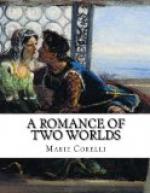“That was a good one,” remarked Mr. Challoner. “There was nothing undecided about that clap. Its mind was made up.”
Zara suddenly rose from her seat, and drew aside the window-curtains.
“I wonder if it is raining,” she said.
Amy Everard uttered a little shriek of dismay.
“Oh, don’t open the blinds!” she exclaimed. “It is really dangerous!”
Heliobas glanced at her with a little sarcastic smile.
“Take a seat on the other side of the room, if you are alarmed, madame,” he said quietly, placing a chair in the position he suggested, which Amy accepted eagerly.
She would, I believe, have gladly taken refuge in the coal-cellar had he offered it. Zara, in the meantime, who had not heard Mrs. Everard’s exclamation of fear, had drawn up one of the blinds, and stood silently looking out upon the night. Instinctively we all joined her, with the exception of Amy, and looked out also. The skies were very dark; a faint moaning wind stirred the tops of the leafless trees; but there was no rain. A dry volcanic heat pervaded the atmosphere—in fact we all felt the air so stifling, that Heliobas threw open the window altogether, saying, as he did so:
“In a thunderstorm, it is safer to have the windows open than shut; besides, one cannot suffocate.”
A brilliant glare of light flashed suddenly upon our vision. The heavens seemed torn open from end to end, and a broad lake of pale blue fire lay quivering in the heart of the mountainous black clouds—for a second only. An on-rushing, ever-increasing, rattling roar of thunder ensued, that seemed to shake the very earth, and all was again darkness.
“This is magnificent!” cries Mrs. Challoner, who, with her family, had travelled a great deal, and was quite accustomed to hurricanes and other inconveniences caused by the unaccommodating behaviour of the elements. “I don’t think I ever saw anything like it, John dear, even that storm we saw at Chamounix was not any better than this.”
“Well,” returned her husband meditatively, “you see we had the snow mountains there, and the effect was pretty lively. Then there were the echoes—those cavernous echoes were grand! What was that passage in Job, Effie, that I used to say they reminded me of?”
“’The pillars of heaven tremble, and are astonished at His reproof ... The thunder of His power, who can understand?’” replied Effie Challoner reverently.
“That’s it!” he replied. “I opine that Job was pretty correct in his ideas—don’t you, reverend sir?” turning to Father Paul.
The priest nodded, and held up his finger warningly.
“That lady—Mrs. Everard—is going to sing or play, I think,” he observed. “Shall we not keep silence?”
I looked towards Amy in some surprise. I knew she sang very prettily, but I had thought she was rendered too nervous by the storm to do aught but sit quiet in her chair. However, there she was at the piano, and in another moment her fresh, sweet mezzo-soprano rang softly through the room in Tosti’s plaintive song, “Good-bye!” We listened, but none of us moved from the open window where we still inhaled what air there was, and watched the lowering sky.




